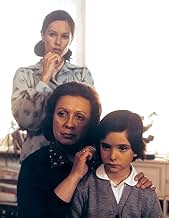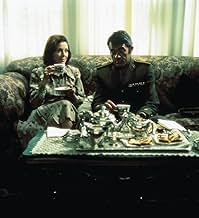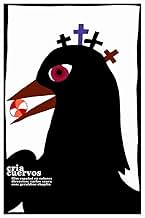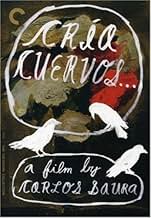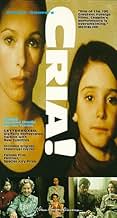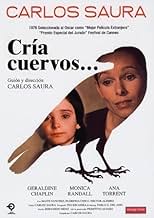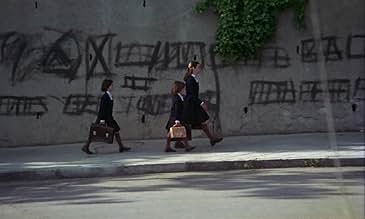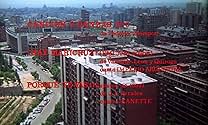AVALIAÇÃO DA IMDb
7,9/10
12 mil
SUA AVALIAÇÃO
No crepúsculo da ditadura de Francisco Franco, uma órfã de oito anos e suas duas irmãs encontram refúgio na casa de sua tia, fazendo todo o possível para se acostumar a uma nova realidade.No crepúsculo da ditadura de Francisco Franco, uma órfã de oito anos e suas duas irmãs encontram refúgio na casa de sua tia, fazendo todo o possível para se acostumar a uma nova realidade.No crepúsculo da ditadura de Francisco Franco, uma órfã de oito anos e suas duas irmãs encontram refúgio na casa de sua tia, fazendo todo o possível para se acostumar a uma nova realidade.
- Prêmios
- 8 vitórias e 4 indicações no total
Conchita Pérez
- Irene
- (as Conchi Perez)
Mayte Sanchez
- Maite
- (as Maite Sánchez)
Mónica Randall
- Paulina
- (as Monica Randall)
Josefina Díaz
- Abuela
- (as Josefina Diaz)
Germán Cobos
- Nicolás Garontes
- (as German Cobos)
Héctor Alterio
- Anselmo
- (as Hector Alterio)
Julieta Serrano
- Ana
- (narração)
Avaliações em destaque
10zetes
A perfect sister film to one of my absolute favorites, Spirit of the Beehive. It also stars Ana Torrent and has similar themes. And I like it probably as much. Torrent, three years older but looking pretty much the same, plays the middle child of three girls. At the beginning of the film, their father has just died. Their mother (played by Geraldine Chaplin) died a while back. The film is told through the mind of Ana, who is still mourning her mother, and she often sees her. It can be confusing at the beginning. Chaplin also appears as the adult Ana, who narrates some of her thoughts, or possibly as what Ana believes she will become. This is very ambiguous. The girls' aunt Paulina is now taking care of them. The duty was kind of forced upon her and, while she's trying her hardest, it's taking its toll. She's stern and not well liked by the girls, especially Ana. There isn't much plot, per se, and what little there is shouldn't be ruined. We often see Ana's imagination and memories come to life. We see her witness fights between her parents. Later on, she reenacts them with her sisters. The film is about what children observe, how they interpret it and how they act on those interpretations. The film also has political ramifications, subtle ones that are pretty difficult to grasp. The title is the beginning of a Spanish proverb that goes: "Raise ravens, and they'll tear out your eyes." Like Spirit of the Beehive, the film depicts a child experimenting with her own cruelty and violence. Supposedly this is all a criticism of the Fascist government (Franco had just died by this point, so his regime was just on its way out). It's a very dense and fascinating movie. You'd probably still be swimming through its mysteries on a hundredth viewing. If you thought possibly that Ana Torrent was not acting in Spirit of the Beehive, this will set you straight. Her blank, soulful expression is here in full force, of course, but here you see the slightest smile creep across her face, and you can just tell exactly what she's thinking. I'm afraid I've done an awful job reviewing Cría Cuervos. I haven't expressed how touching it is when dealing with Ana's loneliness (there's a scene where she dreams that her mother pops into her bedroom to tell her a story that's just heartbreaking), or how it often straddles dark comedy, like the scenes between Ana and the maid. I think that difficulty in reviewing it shows just how layered and confounding the film is. It shoots right up my favorites list. It's easily the best film I've seen all year. Bravo to Criterion for bringing this one to DVD. Hope they also get to Saura's La Caza sometime in the future.
This film is such a splendid experience that it's difficult to really describe objectively why. The plot, the characters are revealed at a perfect tempo, keeping the audience engrossed and anticipating what's next. Any film with such sparse dialogue needs to make the rare lines worthwhile, and Saura certainly does, probably learning from Erice, the master of indispensable dialogue. Ana Torrent invites all sorts of Erice comparisons, but I see Saura taking a step beyond him here visually.
"Beehive" was a landmark film, and unlike anything that had been made. But the camera maintained the same distance and the story was fundamentally allegorical. Saura experiments with distance, sometimes following the characters closely, sometimes giving an omniscient birds eye view of the area. Sometimes remaining a mere witness to what's happening. It's very carefully calculated to best enhance the scene and keep these extraordinary events within the realm of possibility.
If there's such a film as a director's film, this is it. Although it is certainly worthwhile for the performances as well.
5 out of 5 - Essential
"Beehive" was a landmark film, and unlike anything that had been made. But the camera maintained the same distance and the story was fundamentally allegorical. Saura experiments with distance, sometimes following the characters closely, sometimes giving an omniscient birds eye view of the area. Sometimes remaining a mere witness to what's happening. It's very carefully calculated to best enhance the scene and keep these extraordinary events within the realm of possibility.
If there's such a film as a director's film, this is it. Although it is certainly worthwhile for the performances as well.
5 out of 5 - Essential
In Madrid, the orphan sisters Irene (Conchota Pérez), Ana (Ana Torrent) and Maite (Maite Sánchez) are raised by their austere aunt Paulina (Mônica Randall) together with their mute and crippled grandmother after the death of their mother (Geraldine Chaplin) and their military father Anselmo (Héctor Alterio). Ana is a melancholic girl, fascinated by death, after seeing her mother having a painful death and her father dead in bed.
"Cria Cuervos" is a beautiful and sad movie of Carlos Saura that can be watched in two levels: in the first plane, it is a film that recalls the style of the family dramas of Ingmar Bergman. However, in a deeper level, the story is actually a metaphor of the recent Spanish political history, and each character represents a segment of their society: Ana's father represents the military dictatorship of Franco; her dying mother, the republic; her grandmother, those who miss the republic; Ana is probably the youth with a sad childhood surrounded by deaths. The conclusion is a message of hope for the people. I believe that those familiarized with the Spanish history would find many other elements, but in both levels this movie is wonderful. The title is a reference to the Spanish proverb "Cría cuervos y te sacaran los ojos" which means "Raise the ravens, and they will remove your eyes". Ana Torrent shows her amazing talent in the beginning of her successful career. My vote is eight.
Title (Brazil): "Cría Cuervos " ("Raise Ravens ")
"Cria Cuervos" is a beautiful and sad movie of Carlos Saura that can be watched in two levels: in the first plane, it is a film that recalls the style of the family dramas of Ingmar Bergman. However, in a deeper level, the story is actually a metaphor of the recent Spanish political history, and each character represents a segment of their society: Ana's father represents the military dictatorship of Franco; her dying mother, the republic; her grandmother, those who miss the republic; Ana is probably the youth with a sad childhood surrounded by deaths. The conclusion is a message of hope for the people. I believe that those familiarized with the Spanish history would find many other elements, but in both levels this movie is wonderful. The title is a reference to the Spanish proverb "Cría cuervos y te sacaran los ojos" which means "Raise the ravens, and they will remove your eyes". Ana Torrent shows her amazing talent in the beginning of her successful career. My vote is eight.
Title (Brazil): "Cría Cuervos " ("Raise Ravens ")
Told through the perspective of a young child - and her older self - and interweaving past, present and future, but also includes imagined and surreal scenes, albeit staged so masterfully that it all remains stringent and comprehensible and the political implications are apparent; again, Geraldine Chaplin convinces in a double role (as the mother and as the adult child.)
I have seen several thousand films in my life and this one became the top one almost instantly. Ever since I have watched it several times and it has never failed to impress and delight me - it even increases the sense of mystery undelying in its baroque and compelling history. On my opinion, it is Carlos Saura's masterpiece and perhaps the best film ever made about the mysterious inner world children live in and create. There is so much to be enjoyed in this film, that a conventional review will not make it justice.
Você sabia?
- CuriosidadesThe title in Spanish stems from the phrase "Raise ravens and they'll pluck out your eyes." The equivalent phrase in English would be "you reap what you sow."
- Cenas durante ou pós-créditosThe closing credits identify Cancion y Danzas Number 5 of Frederic Mompou. But it was definitely Number 6 that we heard.
- ConexõesFeatured in Zomergasten: Episode #4.1 (1991)
- Trilhas sonorasCanción y Danzas N.6
Composed by Frederic Mompou (as Federico Mompou)
Principais escolhas
Faça login para avaliar e ver a lista de recomendações personalizadas
- How long is Cría Cuervos?Fornecido pela Alexa
Detalhes
- Data de lançamento
- País de origem
- Central de atendimento oficial
- Idioma
- Também conhecido como
- Cría Cuervos
- Locações de filme
- 15 Calle de María de Molina, Madri, Espanha(family house)
- Empresas de produção
- Consulte mais créditos da empresa na IMDbPro
Bilheteria
- Faturamento bruto mundial
- US$ 14.548
- Tempo de duração
- 1 h 45 min(105 min)
- Mixagem de som
- Proporção
- 1.66 : 1
Contribua para esta página
Sugerir uma alteração ou adicionar conteúdo ausente

